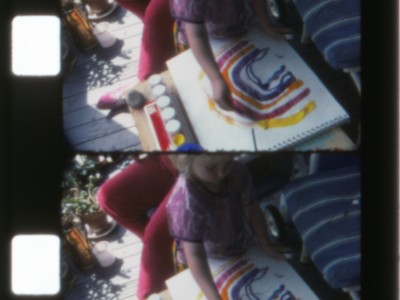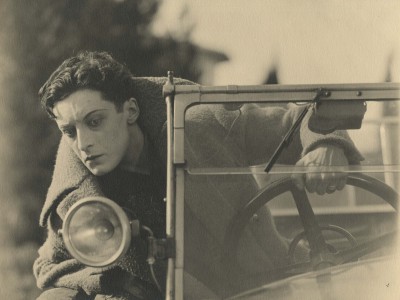
Gregory Markopoulos' Illiac Passion introduction and post-screening discussion with Haden Guest and Robert Beavers.
Transcript
John Quackenbush 0:00
April 7th 2014, the Harvard Film Archive screened Gregory Markopoulos’ Illiac Passion. This is the recording of the introduction and the Q&A that followed. Participating are HFA Director Haden Guest and filmmaker Robert Beavers.
Haden Guest 0:23
Good evening and welcome to the Harvard Film Archive. My name is Haden Guest, I'm the Archive’s Director. It's a real pleasure to be here tonight for the second screening in this series dedicated to the work of the great Gregory Markopoulos. And tonight, we're going to be seeing another major early work, The Illiac Passion, made between the years of ‘64 and ‘67. A work that brings to a kind of climax Markopoulos’ long fascination with mythology. Markopoulos was a Greek American, born and raised in Ohio, and yet always had his ancestral land, in his imagination, in mind. And in fact, it was there where he would go later in his career and realize some of his other major films. It's a great thrill and honor to have with us tonight, Robert Beavers, who will be offering some words of introduction about this film, The Iliac Passion.
This program is called a “Markopoulos Prelude” because it is indeed a prelude to a much larger retrospective, which we're planning for the fall 2014. Starting in September, we're gonna have a number of programs and we're going to be showcasing many of Markopoulos’ major works. It's going to be an event which will take place at the same time as the publication of the first collected anthology of Markopoulos’ writings that will be called Film as Film. And Markopoulos was a very important theorist and prolific writer whose writings, whose ideas about film-form really inspired a generation of filmmakers. And so it's going to be a really important occasion to have this text available.
Please join me in welcoming Robert Beavers.
[APPLAUSE]
Robert Beavers 2:34
Good evening, and I will just say a few words about The Illiac Passion. This was a vision that began in the filmmaker’s student days, so from almost the very beginning of his filmmaking career, he wanted to make a film based on Prometheus. And the intention was then expanded in the ambition to make a universal film and to incorporate all the passions in relation to his own favorite Greek myths. And so, the structure of the film is unusual in the fact that the central figure in the film is actually one torso—the central figure. And all of the myths which are shown emblematically are—I think Gregory used the expression—molecules, atoms of this one personality. He transferred, of course, the idea of fire to the passions. I would be very happy to speak about this film after you've had a chance to see it.
[APPLAUSE]
John Quackenbush 4:10
And now Robert Beavers and Haden Guest.
Haden Guest 4:14
[AUDIO MISSING] … I was reading in P. Adams Sitney’s book, for instance, this idea of having at one point, even a multidimensional almost experience using both thirty-five-, sixteen- and eight-millimeter. I was wondering if this is one way we could begin to discuss this complex and fascinating film.
Robert Beavers 4:43
Well, I think that was at a particular moment in its development that the filmmaker thought that each format would have a significance of its own. And in one of the essays he has written what the significance of the eight-millimeter, what the significance of the sixteen. And the thirty-five-millimeter, and I think using the eight as the interior. And, then he did do a test of which there exists only, I think a three- or four-minute fragment of using masks of different types of different-shaped screens, circular and a Rorschach. And so those were different stages. The film that he sent to the lab was actually three-hours long, and then for a number of reasons he felt it had to be completed and he had found enough money to print the film. And then there was a terrible situation in the lab itself. And he had to fly back and forth several times in 1967. So the version that we have seen here is a version that was edited from that three-hour version, within a period of maybe three weeks into this version that we have seen. And it is not the final end of the journey of The Illiac Passion because in his final, eighty-hour work called Eniaios, which means “unity and uniqueness” there are reels of The Illiac Passion and all of the twenty-two cycles. And there are twenty-seven reels, which was from The Illiac Passion. So that means that this work followed him from the beginning until the end, this Promethean idea.
But I would like to say something else, the film was made, no one was paid. And in a way, there are two films in this period of Gregory's work. One is The Iliac Passion, which has about twenty-eight individuals in it. And then within six months of having completed The Illiac Passion, or a year, he made Galaxie, which is a collection of film portraits of another thirty individuals. And I think these two films together sum up his New York, or his universe that he constructed out of New York. And I must say, I find it's a utopian New York, because it is one that has so little relation to money. Although it does have a relation, it had the relation of banking and of using. Also, while I was looking at it, I was thinking of the out of date stocks that were used. I know that Jack Smith, who appears in the film, that the filmmakers had contact with a woman, a mysterious businesswoman on 57th Street, and she had a relationship to Kodak and was one of the few people who did a business in out-of date-stocks. And there was always an ongoing saga about getting material from her, paying for it...
Haden Guest 8:54
Well, no, I wanted to bring up this the larger version, because in some ways, I feel like the force of the film comes from this kind of compression, whether it's just, you know, this idea of taking an entire universe and bringing it down to the size... and yet at the same time still having this sort of epic sweep and scope. But this bringing up Galaxie, too, also brings me to the question about how this film, in your opinion, or perhaps this is something that Markopoulus spoke or wrote about, you know, the idea of myth-making, because it seems that here we have the filmmaker himself appearing in the film and some of these really haunting and amazing shots, especially those ones in the mirror. And at the same time, we also have these recognizable artists who were themselves becoming the sort of myths and then at the same time, of course, the myths themselves that resonate and at the same time remain and sort of hover and float throughout the film. So I was wondering if maybe you could speak more about the idea of myth and myth-making in this film, and then in Markopoulos’ cinema.
Robert Beavers 10:14
Well, while you were speaking, I was thinking of a phrase that I think Gregory either used in his writing or spoke maybe more colloquially, “real-life scenario,” that the way of choosing someone to incorporate the figure that he envisioned, but to choose the person and then have them be themselves to a certain– But of course, within the strict sense of his composition.
And… obviously when I speak, I'm simply doing a kind of improvisation on my thoughts at this moment, they are not so directly related. And they are, of course, only related in the sense of my own memories. So when I think of the significance of archetypes and Jungian concepts in the 60s, and that this was quite important for this film. There are five very, very beautiful filming notebooks, in which Gregory has done many, many drawings, in relation to his research for each character. So there are chapters for each of the very incredibly free types of drawings of what he was [INAUDIBLE]. I hope sometime that part of his archive might be exhibited [INAUDIBLE].
Haden Guest 12:08
That would be fantastic. I mean, one of the many levels of the film, I think, is we have these costumed archetypal... you know, the performance of the myths or the figures, and then we also have this sort of domestic and almost, at moments, sequences, all but almost a documentary feeling. And I think, the woman who, I think it's Pandora, right, who’s then in the kitchen with Jack Smith?
Robert Beavers 12:47
No, I think it's actually, Eurydice.
Haden Guest 12:50
Okay, Eurydice.
Robert Beavers 12:51
It doesn’t matter you know, as I said at the beginning, they are all molecules in this one figure.
Haden Guest 12:57
Right. But suddenly, you know, the way in which I think and again, thinking about this idea about, you know, the different concept of myth, this idea of myth, I think, also being somehow the fabric of everyday life, you know, that we get, and so those scenes that I think really speaks to that...
Robert Beavers 13:12
We have Persephone, finding her way to Hades through a, what do you call it...
Haden Guest 13:19
Subway?
Robert Beavers 13:22
Manhole.
Haden Guest 13:24
And this is an idea, though. I mean, it's just thinking about the evolution of his sort of cinematic imagination, I mean, in which the interest in myths and all this, did this come from his childhood or…?
Robert Beavers 13:45
Yes, yes. When I spoke yesterday, and actually what I would say constantly when I think about Gregory's filmmaking, I see this very distinct balance between doing research, months and months of research, for instance, and the concept, and then being totally open to improvising. To the extent that the film that he worked on for a number of years, then he decided he could edit it in two or three weeks. And this evolves. If you were here yesterday, you saw Ming Green, and in The Illiac Passion, which is edited in the camera. Here, I have seen once some of the rushes from Illiac Passion, and the superimpositions, for instance, in The Illiac Passion are also, of course, superimpositions done in the camera. They're not lab work. So very special ideas about chance, but with this other pole of trying to reach perfection. So that has very much to do with his personality.
Haden Guest 15:22
And, you know, the presence of the filmmaker here is not only onscreen, but also [on] the soundtrack as Markopoulos himself reading this text, and this text of the voiceover is so fascinating because it's constantly both moving towards meaning—like we almost catch these phrases—and at the same time fracturing it. After seeing last night's program, you know, of course, Twice a Man, the syllables are being cut out. Here, this is something different, this kind of incantatory quality, similar to the myths where we both recognize and we don't. I was wondering if you could speak a bit about the soundtracks. I'm wondering in terms of this idea about control and chance, like how this was actually done, was this a performance? Or was this something that he actually wrote it out, like a score?
Robert Beavers 16:17
This is a translation by Thoreau of Aeschylus. And it was read in one sitting without any change.
Haden Guest 16:30
And were the annotations made that he knew he was going to repeat?
Robert Beavers 16:35
I don’t think so. I think he had the play in front of him. And he improvised on the spot. I mean, how he placed those large units, of course, is different. Sometimes I wonder, if he used the entire reading, what the difference was between the three-hour version and this version?
Haden Guest 17:09
Let's take some questions, comments. The audience. [PAUSE] We’re still in a trance. Yes, there’s a microphone right here.
Audience 1 17:26
Thank you. So the myth of Prometheus... You know, I found so much of what I know about the myth in the film, I was seeing it come out all over the place, but I I didn't really see the punishment of Prometheus.
Haden Guest 17:50
But you hear the birds, right?
Unknown Speaker 17:52
We see the birds, hear the birds. There's a lot of eyes. I was just wondering what your take on that… maybe as a mission or sort of a poetic take on letting us decide what exactly is his punishment.
Robert Beavers 18:11
You know what? Gregory had a very, what shall I say… evasive way of, or poetic way of saying something about that. In the essay, which you might have a chance to read, because he wrote a very beautiful essay about the making of The Illiac Passion, called “The Adamantine Bridge.” Because of course, the film opens with Brooklyn Bridge. And he said, “Aeschylus wrote three plays. And we have only one. And my relation was to think about what the other two might have been.” You know, I think there's also this sense of transforming the Promethean idea not centering on the punishment, but more in the direction of, I would almost say sacrifice, but... transformation! And transformation of the passions into this positive realm.
Haden Guest 19:33
Brittany.
Brittany Gravely 19:36
Hi, you had said that he had interesting ideas about chance? And I was wondering with the superimpositions, they seem really well choreographed. But was there chance involved in those or did he plan it all out?
Robert Beavers 19:54
No, I'm sure there was. Also chance in locations, chance in the combination of the individual and the location. You know, I should have mentioned yesterday that, for instance, in Twice a Man, he didn't let people know what the film was about, including the people in the film. So he was the kind of filmmaker or director who said, “Move this way, move that way.” So that was the controlled part. But the other part was, he would incorporate things that he observed about them while he was with them, and then also it would come into the [INAUDIBLE].
Haden Guest 20:58
I mean, that Warhol appearance is so striking because it's almost as if he's got… it’s his space, you know, almost with Warhol, they had created this little sort of flowered playroom where he's got the silver chariot. I was wondering if you could speak at all about Warhol’s appearance in here. I mean, because it's just that scene is so striking, and I was wondering what kind of discussions or stories you might have heard about..
Robert Beavers 21:33
I don’t. Gregory also kept a diary, which is in fifty-two volumes, and it covers the years from the mid-50s until his death in ‘92. And so, I have not read it myself. But sometimes I have looked in it, and in this period—earlier than Illiac Passion, but say between Twice a Man and Illiac Passion—I've found really extraordinary and perceptive critiques of Warhol’s films as he was seeing them, as they were being shown for the first time. The one that I remember, because I shouldn't say as if I am seeing everything, but he had a very interesting take on Vinyl. So… but I have no idea what he thought of Warhol.
Haden Guest 22:43
Do you recall what he thought of Vinyl, his comment?
Robert Beavers 22:47
I don't think I can say.
Haden Guest 22:51
[LAUGHS] I want to take a look at this diary one day myself. Other questions?
Robert Beavers 22:57
Anything to us?
Haden Guest 23:00
Now's the time. If not, you will have a chance again in September. Thank you so much.
[APPLAUSE]
© Harvard Film Archive
Related film series
Explore more conversations
Elaine May

Liz Coffey & Saul Levine

Sarah Keller

Laura Frahm

